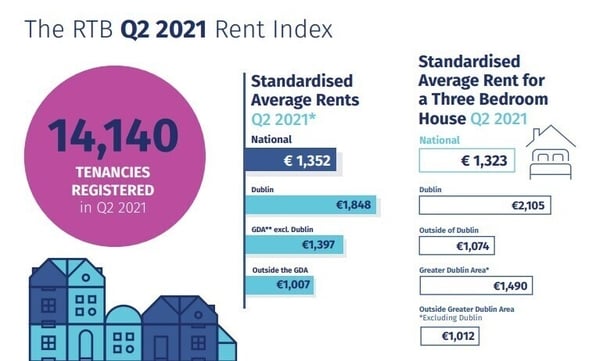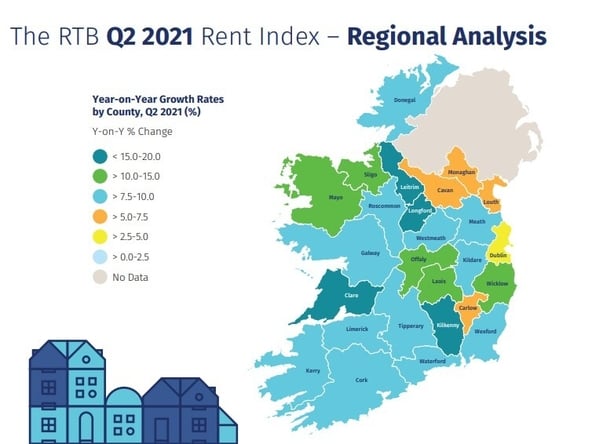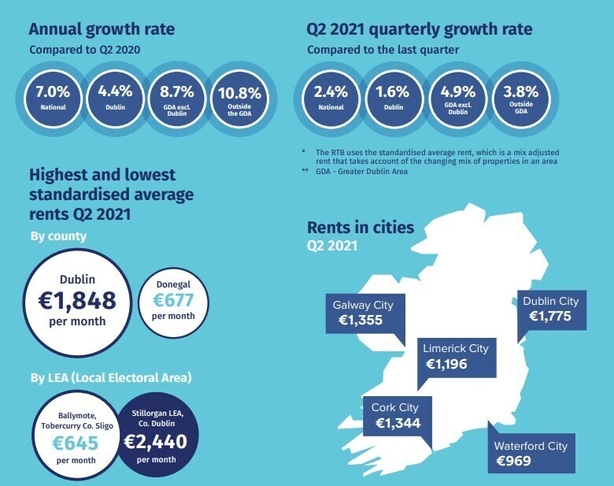Rents nationwide grew by 7% on an annual basis in the second quarter of 2021, the latest rent index from the Residential Tenancies Board (RTB) shows today.
This marks the highest national growth rate seen since the first quarter of 2019.
The national standardised average rent stood at €1,352 in the second quarter, an increase of €32 compared to the previous quarter.
Dublin had the highest standardised average rent in the three months from April to June at €1,848 a month.
The county with the lowest monthly rents was Donegal at €677 a month.
The RTB said that at a Local Electoral Area (LEA) level, the highest standardised average rent was in Stillorgan in Co Dublin at €2,440 a month.
The lowest was seen in Ballymote-Tobercurry in Co Sligo at €645 a month.
Today's figures show that the standardised average rent for houses stood at €1,347 a month, an increase of 3.4% on the previous quarter and a rise of 9.1% compared to the same time last year.
Meanwhile, the standardised average rent for apartments stood at €1,379 a month, up 1.9% on the first quarter of 2021 and 5.5% in the second quarter of 2020.
Galway City had the second highest standardised average rent level in the second quarter at €1,355, while the standardised average rent in Cork City stood at €1,344 a month was €1,196 in Limerick City.

The only city with standardised average rent lower than €1,000 a month was Waterford City where it was €969 a month, the RTB added.
Today's index also reveals that ten counties have standardised average rents above €1,000 a month - Cork, Dublin, Galway, Kildare, Kilkenny, Laois, Limerick, Louth, Meath and Wicklow.
On a quarterly basis, rents rose in all but three counties in the second quarter of 2021.
Rents in Leitrim increased the most with a quarterly growth rate of 17.6%. On the other hand, rents in Louth experienced the largest quarterly decrease, falling by 0.5%.
The RTB said that the standardised average rent in the Greater Dublin Area (which includes Meath, Kildare and Wicklow) stood at €1,397 while it was €1,007 outside the GDA.
We need your consent to load this rte-player contentWe use rte-player to manage extra content that can set cookies on your device and collect data about your activity. Please review their details and accept them to load the content.Manage Preferences

It also reported a decline in the number of tenancies registered with the RTB. Its index for the second quarter of 2021 had 13,884 tenancies compared to 16,085 in the first quarter of the year.
Padraig McGoldrick, interim director of the RTB, said the economy began to emerge from lockdown with a phased reopening, and people began to readjust to their living and working situations in the second quarter of 2021 and today's index provides an important insight into how the rental sector is adapting to these changes.
"From the initial early pandemic slowdown and reduction in rent levels, rents nationally have rebounded quickly, mainly driven by activity outside of Dublin," Mr McGoldrick said.
"In particular, rents are continuing to increase more rapidly along the commuter belt and more slowly in Dublin and other urban areas indicating that the pandemic has seen an immediate impact of people moving from urban areas, particularly Dublin. This may reflect an emerging trend around long-term working and lifestyle choices," he added.
But Padraig McGoldrick said that there is still a lot of uncertainty around the emerging trends.

Mr McGoldrick also said that while the latest rent levels will not yet have been impacted by the change in rules for rent setting introduced in July, the level of increase is a source of concern.
He said that while there may be legitimate reasons reflecting the rate of increase, it may also indicate an unacceptable level of non-compliance by landlords with rent setting regulations restricting rent increases in Rent Pressure Zone areas (RPZ).
"The impact of not complying with these measures can be very severe, and the RTB is committed to ensuring increased compliance with these requirements," he warned.
Where landlords circumvent the legislation in relation to RPZ rent caps, the RTB has the power to investigate and apply sanctions, with fines of up to €15,000 and/or costs up to €15,000.
The RTB has started almost 400 investigations into improper conducts and to date almost €260,000 has been refunded to current and former tenants as a direct result of breach of rent setting rules.
"On the basis of a request from Minister Darragh O'Brien, the Minister for Housing, Local Government and Heritage, the RTB will escalate its response and introduce an accelerated and focussed campaign to identify and, where necessary, pursue those who abuse or ignore their rent setting responsibilities," Mr McGoldrick said.
Sinn Féin seeks three-year rent freeze
Sinn Féin's finance spokesperson has called for on the Government to introduce a rent freeze for three years.
During Leaders' Questions in the Dáil, Pearse Doherty also asked that the budget include a refundable tax credit for renters that would put a month's rent back in their pockets.
Referring to the RTB report, Deputy Doherty said the cost of rent is "out of control" and "runaway rents need to be stopped".
He told Tánaiste Leo Varadkar: "I know you believe that landlords should be prioritised ... and their incomes are more important than renters being able to have a decent life".
In response, Mr Varadkar accused Deputy Doherty of "rubbish politics".
The Tánaiste said: "It's a classic tactic of populist politicians to claim that their opponents believe something and then argue with it, to put words into somebody's mouth and then criticise them for it".
Mr Varadkar said the Government's view is that rents in Ireland are too high and described a recent decision to link rents to inflation as a "rent freeze in real terms".
The Tánaiste said there was a crisis not just in affordability but also in availability of properties and the Government did not want to see landlords deciding to "sell up".
He referenced the Housing for All plan, which he said would see continued investment in the area and also pointed to the Land Development Agency and increased building of social housing as examples of Government action on the issue.
Deputy Doherty responded, saying he was not interested in snipes against him.
Additional reporting Tommy Meskill

